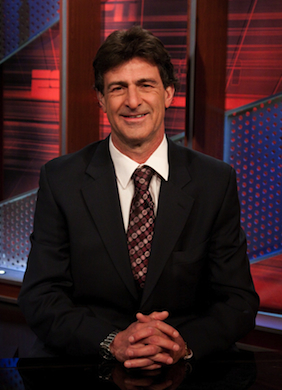World Cup hero, ESPN analyst
Mario Kempes reflects on career
Mario Alberto Kempes is the kind of sports legend you should know about, but probably don’t.

The ESPN soccer analyst is widely regarded as being one of the best 10 players in soccer history.
But most of all, he’ll be celebrated for the one moment in every kid’s dream.
It was June 25, 1978. Holland and Argentina were playing in a World Cup Final.
Kempes already had scored the only goal for Argentina in 1-1 tie at fulltime.
In the overtime, he scored the game-winning goal for what would eventually be a 3-1 win in front of 70,000 crazed home fans celebrating Argentina’s first ever World Cup title.
It’s been a little more than 33 years since that glorious moment, which ESPN highlighted in previewing its 2010 World Cup coverage in a I Scored A Goal In The FIFA World Cup Final vingettes.
On Sunday, Feb. 19 at 8 p.m. ET, ESPN Deportes’ La Liga Confidencial presents the first documentary (previewed above) on Kempes’s footprint in Spain.
Front Row spoke with Kempes recently:
FR: Was the transition from player to TV analyst hard for you?
Kempes: It took a while, because I was a coach in between those two things. I retired in the mid-90s and coached in Bolivia until 1999. After that, I went back to Europe in 2001 and around a year later I got an offer to work on radio and TV for a public broadcast show that televised soccer matches in Valencia. I was watching soccer on TV on my own anyway, so I felt I might as well be at Camp Nou watching anyway.
FR: What’s the biggest difference between working on the radio and TV?
MK: It’s basically the same, it’s just that on TV people get to see you. In fact, when we broadcast soccer matches, you are seen in neither one [laughter]. I did get to be on-site more often when I did radio, though.
FR: Do you miss being a coach after 12 years of being out of the sidelines?
MK: No, I don’t, but I really do want to come back and coach again. If it doesn’t happen, I’m fine with that as well.
FR: What would be your dream comeback scenario: you on one team facing Lionel Messi on the other?
MK: No, coaching in Argentina is not an option at the moment. I think I can coach anywhere in the world but there. Then again, it’s not like I can expect to get a team like Barcelona after so many years of not coaching.
FR: How did you end up getting to ESPN?
MK: I tried out as a color commentator doing one half of a soccer match with Luis Omar Tapia, and then from 2004 to 2007 I did color and participated in a show called Goles de España [a Spanish League highlight show].
FR: What do you think are the biggest differences between the soccer you played in the 70’s and 80’s and the one being showcased nowadays?
MK: The soccer ball is still the same ball. It can be lighter or heavier, but its essence remains. However, the way players are marketed nowadays is amazing, there is no comparison. I used to have
to call my grandparents in Argentina to tell them I scored, now you can watch soccer from anywhere, anytime.
FR: Do you think your career would have been different if you played in this era?
MK: Who knows? Maybe I wouldn’t have even been a professional soccer player today. If I were to be reincarnated, I would love to come back as a soccer player once again.
FR: You experienced the ultimate glory in 1978, scoring the game-winning goal against Holland in the World Cup Final in front of your countrymen. What was that like for you?
MK: I have always been grateful for being chosen among thousands of Argentinean players to be a part of that squad. The rest was good fortune, being in the right place at the right time, you know?. I
didn’t change as a person and didn’t earn more money, but it was beautiful to be a champion as the World Cup’s top scorer (six goals) and nobody can take that away from me.
FR: What about 1982? You got the chance to play alongside Maradona, but the end result wasn’t what you expected as defending champs.
MK: Look, we screwed up. We thought that we could just win because we were Argentina. We weren’t as focused as we were in 1978, we had more freedom, and we weren’t used to that. The Argentinean player always pays a price if he is not thinking about soccer 24/7. We [were defeated] by Brazil and Italy because of that, but I still believe we were the best team on paper during that World Cup.







